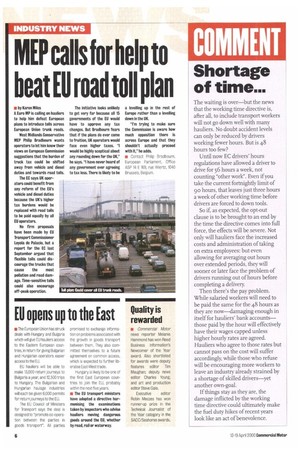Shortage of time...
Page 8

If you've noticed an error in this article please click here to report it so we can fix it.
The waiting is over—but the news that the working time directive is, after all, to indude transport workers will not go down well with many hauliers. No doubt accident levels can only be reduced by drivers working fewer hours. But is 48 hours too few?
Until now EC drivers' hours regulations have allowed a driver to drive for 56 hours a week, not counting "other work". Even if you take the current fortnightly limit of 90 hours, that leaves just three hours a week of other working time before drivers are forced to down tools.
So if as expected, the opt-out clause is to be brought to an end by the time the directive comes into full force, the effects will be severe. Not only will hauliers face the increased costs and administration of taking on extra employees: but even allowing for averaging out hours over extended periods, they will sooner or later face the problem of drivers running out of hours before completing a delivery.
Then there's the pay problem. While salaried workers will need to be paid the same for the 48 hours as they are now—damaging enough in itself for hauliers' bank accounts— those paid by the hour will effectively have their wages capped unless higher hourly rates are agreed. Hauliers who agree to those rates but cannot pass on the cost will suffer accordingly, while those who refuse will be encouraging more workers to leave an industry already strained by a shortage of skilled drivers—yet another own-goal.
If things stay as they are, the damage inflicted by the working time directive could ultimately make the fuel duty hikes of recent years look like an act of benevolence.












































































































